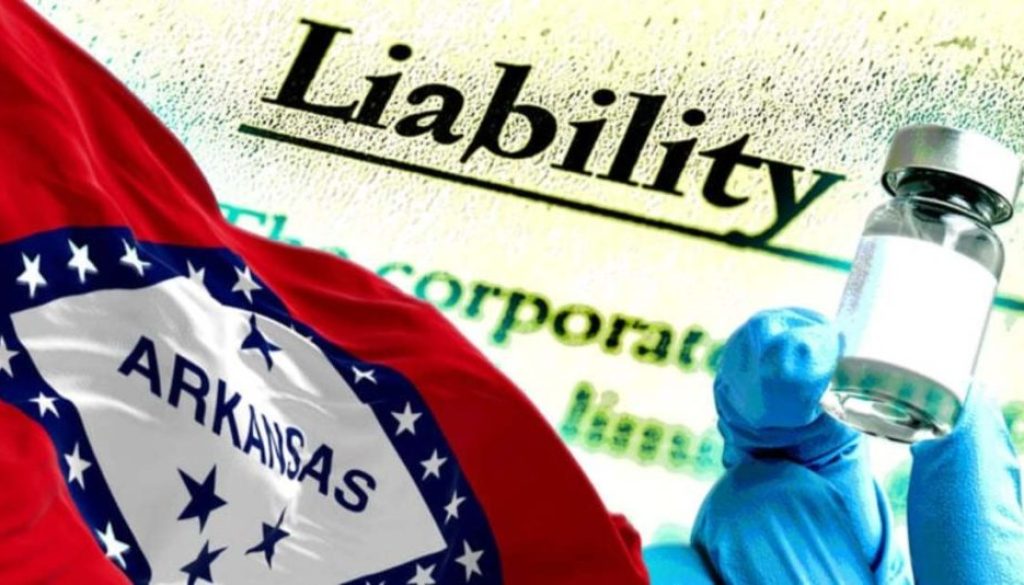Arkansas Looks To Hold Pharma Execs Criminally Liable For Vaccine Injuries
Arkansas lawmakers are weighing legislation that could pierce the pharmaceutical industry’s federal liability shield for vaccine injuries by holding corporate executives criminally liable for “vaccine harms” if they concealed evidence of risks associated with a vaccine that subsequently seriously injured or killed the recipient.
(Children’s Health Defense) Arkansas lawmakers are weighing legislation that could pierce the pharmaceutical industry’s federal liability shield for vaccine injuries by holding corporate executives criminally liable for “vaccine harms” if they concealed evidence of risks associated with a vaccine that subsequently seriously injured or killed the recipient.
Under Senate Bill 6, introduced by Republican State Sen. Bryan King, an executive officer of a pharmaceutical company that “knowingly hides, conceals, omits, or otherwise withholds evidence, documentation, or information that the vaccine has dangerous effects,” would be found guilty of a felony and face a prison sentence of one year to life.
The bill is pending before the Arkansas Senate. King also introduced Senate Bill 5, to hold Pharma executives criminally liable for “prescription drug harm.”
Previous versions of both bills unanimously passed last year in the Arkansas Senate but died in the Arkansas House.
Ray Flores, senior outside counsel for Children’s Health Defense (CHD), welcomed the proposed legislation. He told The Defender:
“Regarding vaccines and other health-related issues, the public is increasingly frustrated with the impervious protection current law and corporate structure afford. The time is ripe to single out those ultimate decision-makers who benefit the most.
“This is an attempt, done properly through legislation, to address that powerlessness currently radiating throughout society.”
California-based healthcare attorney Rick Jaffe called the proposed legislation “an excellent jumping-off point for the serious discussion the country needs to have about vaccines.”
King’s office did not respond to The Defender’s request for comment by press time.
Federal liability shield may not protect against criminal charges
Two federal laws provide civil immunity to vaccine manufacturers.
The National Childhood Vaccine Injury Act of 1986 grants manufacturers broad protection from civil liability for injuries resulting from vaccines listed on the Centers for Disease Control and Prevention’s childhood immunization schedule.
Under the 1986 act, people injured by these vaccines can file a claim under the National Vaccine Injury Compensation Program.
Vaccines like the COVID-19 shots, introduced as an “emergency countermeasure” to address a public health emergency, are covered under the Public Readiness and Emergency Preparedness Act (PREP Act).
Under the PREP Act, manufacturers and other “covered persons” — including doctors, nurses and pharmacists who administer the vaccines — are exempt from liability. Vaccine injury claims for this category of vaccines are filed with the federal Countermeasures Injury Compensation Program.
In an analysis for TrialSite News, attorney Steven O’Connor suggested the proposed Arkansas bill could bypass the federal civil liability shields for vaccine makers.
“While Pharma execs and their firms face sturdy protections against civil liability for vaccine issues, there is no comparable protection for criminal liability,” O’Connor wrote.
“With much of the nation concerned about inadequate safety and efficacy research for our COVID-19 vaccines, Arkansas may be leading the way in a societal shift which will put more onus” on Big Pharma “to act in a transparent, and non-misleading, fashion,” O’Connor added.
O’Connor noted that corporations can be charged with crimes and their executives can, in many instances, also “face charges for actions of the business as a whole.” He cited a March report by Public Citizen that showed an “uptick” in corporate prosecutions since 2022.
O’Connor cited recent U.S. Department of Justice charges against “a swath of defendants relating to distribution of almost 70 million opioid pills” as an example of how Pharma executives can be held criminally liable. Five Pharma distributor executives are among the defendants facing federal charges.
“If criminal activity occurred during the development, manufacturing, distribution and post-administration surveillance of vaccines, the corporate leaders should be held criminally responsible,” said Dr. Joel Wallskog, a Wisconsin orthopedic surgeon who no longer practices due to injuries he sustained from the Moderna COVID-19 vaccine. “If there is evidence that they committed criminal acts and put profits before people, they should serve time in prison.”
Wallskog, co-chairman of React19, a nonprofit representing vaccine injury victims, said the key is to get some of these cases into court, where they may uncover evidence implicating the government and federal regulatory bodies in addition to pharmaceutical company executives.
“The discovery process would be very interesting, to know who in government and Pharma knew what and when about the failure of the vaccines to prevent infection and transmission, and the alarming incidence of adverse events,” Wallskog said.
Wallskog said the Arkansas legislation would serve as “a way for those Americans injured by the COVID-19 shots to seek some financial remedy.”
Law could face obstacles
Arkansas’s proposed bill could face obstacles, said Kim Mack Rosenberg, general counsel for CHD.
“The acts introduced in Arkansas are interesting but also, in my reading, somewhat vague and they leave open many questions and terms — such as what it means to introduce a product to market — that are not defined.”
Rosenberg also noted that the bills will have a limited duration, as they would expire at the end of 2026.
Dr. Meryl Nass, founder of Door to Freedom, told The Defender she “salutes Sen. King for creating this new class of crime” but also pointed out that the proposed legislation “does not involve financial penalties.”
“Should there not be a civil crime of vaccine harm in which injured civilians could receive monetary benefits from the pharmaceutical company officers or the company itself?” Nass asked.
Jaffe said the Arkansas bill “aims unnecessarily high” by exclusively targeting executives.
“I’m not sure how many presidents of Pharma companies know about the specifics of the clinical trials, so they could be exonerated on the knowledge requirement,” Jaffe said. “I think the law should be broadened out to make sure it can target the division heads and people who actually know about the adverse effects and may have hidden them from their superiors.”
And Flores suggested that, at least for vaccines covered under the PREP Act, federal law might supersede Arkansas state law. “The PREP Act’s blanket protection … would most likely extend to those who commit such crimes concerning COVID-19 vaccines since a covered person is immune from suit and liability.”
Jaffe called the proposed laws positive, despite their flaws. “I’d like to see more states propose the same kind of law,” Jaffe said. “If enough states do that, maybe Congress will get involved for national legislation.”
Rosenberg agreed:
“Τhe larger questions these acts raise certainly need to be addressed and, I think, represent a growing recognition by Americans that there are serious and potentially criminal actions taken by pharmaceutical interests and others in the health/medical field and that, for example, what happened with opioids may not be as exceptional, unfortunately, as many people thought.
“The population’s distrust is growing and the lack of transparency and liability in many instances only fuels that distrust.”





